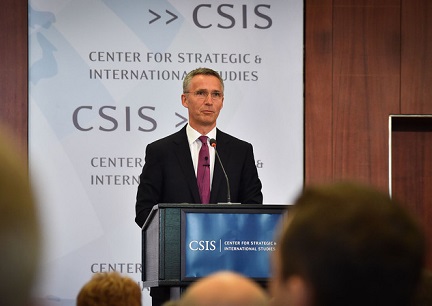Georgia’s future examined amid tense NATO-Russia relations

Georgia is stuck in a difficult place as it pursues its Euro-Atlantic future while facing continued pressure from Russia, says NATO Secretary General Jens Stoltenberg at a speaking engagement in the United States (US).
After meeting US President Barack Obama, Stoltenberg addressed the Center for Strategic and International Studies (CSIS) in Washington D.C. and spoke about the tense relationship between NATO and Russia, and how the Alliance must "adapt” its current approach to global security to meet rising challenges presented by Russia.
The challenges we see coming from the east are clear, and they are coming from a resurgent Russia,” said the top NATO official.
Stoltenberg openly criticized Russia for being responsible for the growing regional and global instability and stated NATO would not bow down to pressure and would continue supporting its Eastern partners Georgia, Ukraine and Moldova "to help them to carry out reforms and build strong institutions”.
These nations are not buffer zones. They are independent, sovereign states. They have the right to choose their own path. And we will continue to help them on that path. Because if our neighbours are more stable, we are more secure,” he said.
In his speech Stoltenberg said Russia’s "aggressive actions” in Ukraine were part of a "disturbing pattern” of behaviour that went well beyond the annexation of Crimea.
He said this pattern undermined the key principles of European security, which are; respect for borders, the independence of states, transparency and predictability of military activities, and a commitment to resolve differences through diplomacy, not force.
He went on to explain each of these four points and how Russia had "broken its commitments” to ensuring global peace.
Through the pattern I have described, in Ukraine, in Georgia and in Moldova, Russia has shown the will to use force, or the threat of it, to coerce its neighbours," said the NATO envoy.
Near the end of his speech Stoltenberg stressed NATO needed to adapt to deal with challenges "that may be with us for a long time” and the Alliance was doing this in three ways:
- Reinforcing our collective defence; reinforcing our deterrence and defence,
- Managing our relations with a resurgent Russia,
- And supporting our European neighbours.
He stressed NATO would continue supporting Georgia, Ukraine and Moldova and said it was in NATO’s interest "as a transatlantic community, to have neighbours that are stable and independent”.
Read the full transcript of Stoltenberg’s speech and following Q&A session here.
 Tweet
Tweet  Share
Share